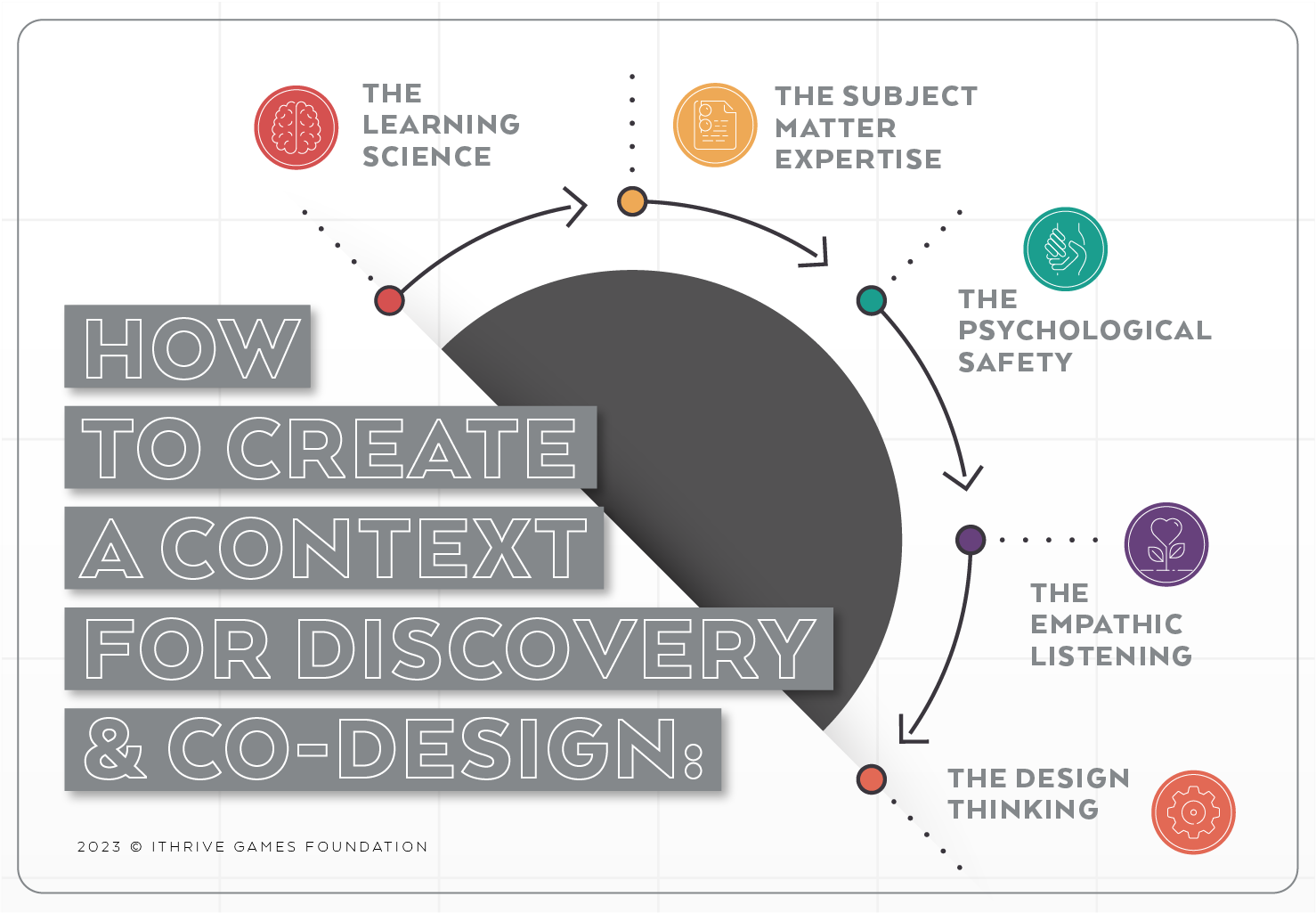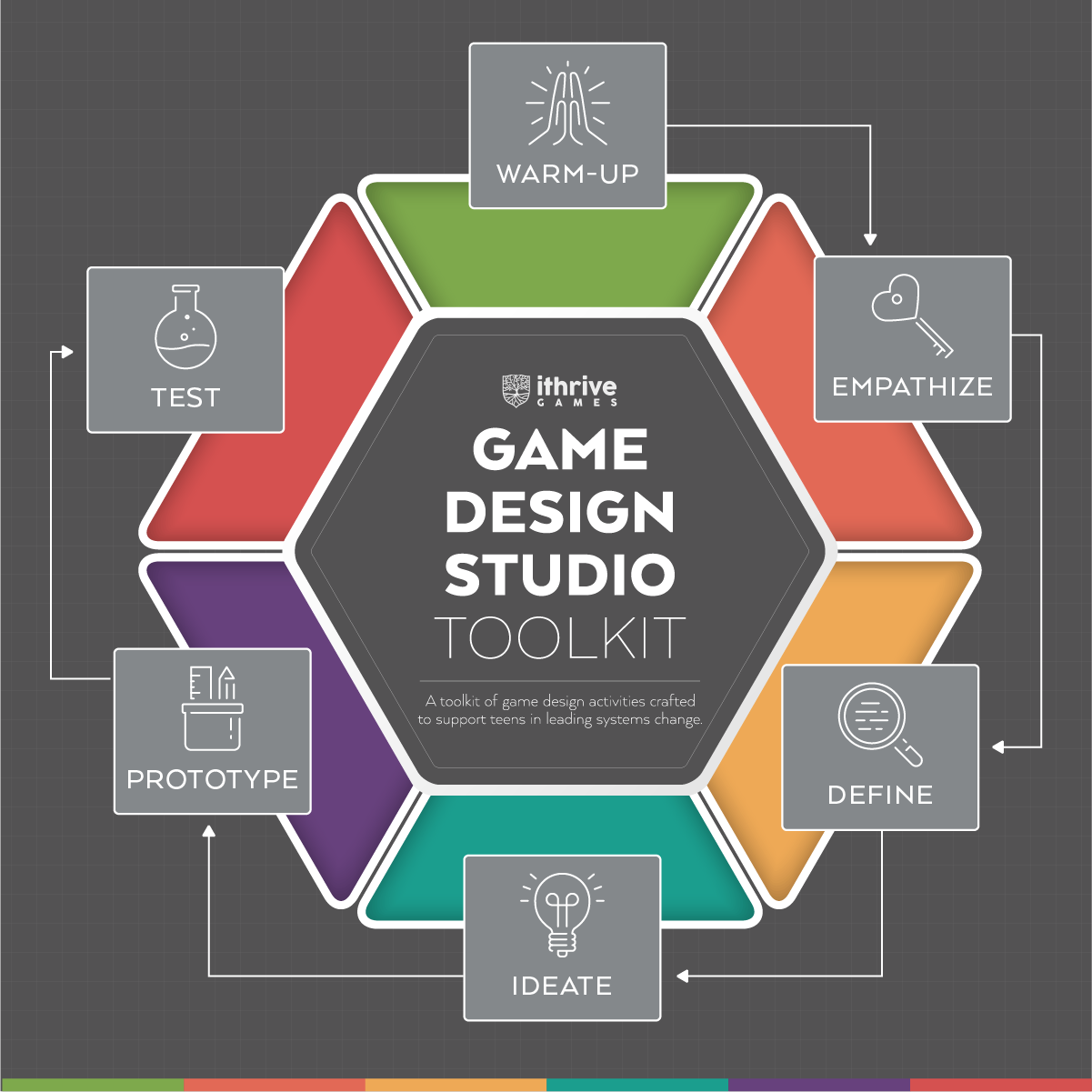
Teen-Centered Co-Design Gets Us To a Playful Solution to Online Extremism
With the Middlebury Institute’s CTEC and alongside subject matter experts and teens, we’re developing a game that helps teens recognize and resist online radicalization. Its co-design process confirms that how we create is as important as what we make.
Teens deserve our care and commitment.
At iThrive Games, our why starts with this simple fact. Young people are doing the work of adolescence in a world marked by unique features and challenges. They thrive when they are supported by systems of care and learning that strengthens their resistance to those challenges. Connecting them to tools that help them live fully and safely is how we do this.
As a 501(c)(3) nonprofit, our work is always impact-driven. Our team of adolescent development, game design, and learning science experts, alongside a network of teen co-designers and collaborators, have spent the last six years co-imagining playful solutions that transform learning and wellness in youth-serving settings and spaces. Since our founding in 2014, iThrive's 'why' has been grounded in our vision of a world where teens are actively engaged, seen, and valued by society, have the necessary support to live healthy, purposeful lives, and where the adults in their worlds have social and emotional learning tools they can bring to the young people they teach and gather with that are as effective as they are engaging.
Shoulder to shoulder with the museums, government agencies, nonprofit organizations, libraries, schools, and research institutions we've worked with, we've fortified our why and discovered more nuanced ones alongside them that share in the same vein of commitment to teen thriving. The impactful games and learning experiences we've made with and for teens mirror and echo our why, bringing it and our learning-science-backed design principles to domains ranging from transformative civic education and disaster preparedness to dating violence prevention and school community-building.
Incidents like what happened at a grocery store in Buffalo, New York, last May cement our why. Marked by an act of white supremacist violence, that Saturday lives in infamy. An 18-year-old, self-described in a manifesto as an ethnonationalist, entered a Tops in a predominantly Black neighborhood armed with a semi-automatic weapon and attacked the people in it. His hate crime, which took ten lives and injured three more, was broadcasted via Twitch, a video game live streaming platform. Communication technologies and social media platforms of the like were used to plan, prepare, and publicize this domestic act of terror. The same tools significantly contributed to his radicalization.
Extremist actors are increasingly targeting adolescents online for recruitment, and while hate in today's digitized world grows more accessible to them, Preventing and Countering Violent Extremism (P/CVE) programs still fail to accurately address the specific needs of this audience. High schools across the United States—hubs for their growth and learning—remain unequipped to contend with the escalating challenge.
With funding provided through the Department of Homeland Security (DHS) FY21 Targeted Violence and Terrorism Prevention (TVTP) Grant program and in partnership with the Center on Terrorism, Extremism, and Counterterrorism (CTEC) at the Middlebury Institute for International Studies, the iThrive Games team has spent the last two years developing a new role-playing simulation game, designed for teens to develop their awareness and resistance to radicalization and build their resilience within their local networks.
To make this a game-based learning intervention that effectively equips adolescents with a lifetime of resilience and helps schools build capacity for P/CVE program administration, iThrive Games has been employing its co-design approach with select schools across the country, inviting young people to take part in participatory design activities that support their voice, design thinking, and agency. The co-creative experience thus far with educators and teens hailing from different neighborhoods in Monterey, CA, Middlebury, VT, Boulder, CO, New York, NY, and Boston, has been another testament that how we create is as important as what we create. Through teen-centered co-design, we innovative, responsive, and relevant solutions, and through the empathic listening it enables, we affirm our why.
CREATING A CONTEXT FOR DISCOVERY AND DESIGN
Participatory design is impactful design. What comes of iThrive's co-design approach with teens—both the context for discovery it creates and the thought partnership it fosters—proves it.
iThrive has facilitated in-person and remote co-design sessions as part of this DHS TVTP FY21 grant-funded project, bringing over 90 young people together with adult stakeholders nationwide. Our Game Design Studio model—a strengths-based, participatory one that rejigs and revolutionizes the typical focus group—invites teens to the table to share their wisdom, beliefs, and perceptions related to extremism and radicalization and empathize, define, ideate, and imagine playful solutions together. Through it, empathy maps turn into affinity ones that have informed and inspired the game-based learning experience we've been developing with the Center on Terrorism, Extremism, and Counterterrorism (CTEC) at the Middlebury Institute in Monterey, CA.
Our co-design sessions are designed to engage teens thoughtfully, centering their wisdom of their own lived experiences. We merged learning science together with subject matter expertise, established norms for psychological safety, employed design thinking prompts supportive of experimentation, reflection, and learning, and engaged in empathic awareness and listening to enrich the co-creative space.

The parts that make the whole of a co-creative space led primed for impactful design and shared discovery.
THE DESIGN THINKING
Our Game Design Studio (GDS) model combines the science of teens' social and emotional development, systems thinking, and gamemaking to leverage the power of play and the breadth of game design to magnify teens' strengths and support meaningful co-creation. The design thinking activities folded into a co-design session via the GDS model helps guide a collective investigation into a social issue, in this case, radicalization and extremism, where teens are creatively prompted to define the human needs that underlie it, map their own experiences, ideate alongside experts, and create solutions reflected in games they envision and prototype.
In line with the model, each co-design session introduced teens to the social issue and invited them to respond to visuals, existing game prototypes, and open-ended prompts that elicit their experiences and perceptions related to the radicalization of young people. Their reactions to hypothetical situations and responses to questions about misinformation, authority, isolation, and more were documented.

Explore iThrive's free-to-download Game Design Studio Toolkit which, includes examples of learning-science-backed design thinking activities created to deeply engage teens.
After reflecting on definitions, understandings, strengths, and vulnerabilities related to extremism and radicalization, teen co-designers took part in the imagining, designing, and refining of game components, like characters, rules, mechanics, win and loss states, folding in their expertise, experiences, and awareness to support the development of the game to come.
THE SUBJECT MATTER EXPERTISE
Vital to each lab of discovery and design assembled as part of this project were the subject matter experts who've enriched each co-creative space with rich, tailored insight. The specialized expertise of the SMEs who worked with us and our partners at the CTEC at the Middlebury Institute for International Studies added to the knowledge-building and knowledge-sharing that animated the experience. Their research, paired with our teen co-designers' takes and lived experiences, got us to a simulation game prototype that supports community resilience to extremism.
THE PSYCHOLOGICAL SAFETY
Norms matter in spaces shared with young people, especially when those spaces strive to be generative. To support the psychological safety of the teens who participated in the co-design sessions, facilitators, stakeholders, and participants were asked and reminded not to disclose any private health information, self-incriminating information, or political, religious, or ideological beliefs. Participants were also asked to abstain from naming or identifying anyone involved in criminal or radical activity. By being transparent about these norms, we set expectations that helped establish the co-design session as a safe and secure place for teens.
THE LEARNING SCIENCE
Learning is situated, active, and socially constructed. We orient teen and adult co-design session participants around this truth so the games and learning experiences they imagine with us create equitable outcomes in the young people they reach. Learning science, as both a design principle and a lever for research, encourages co-designers to consider accessibility, engagement, representation, action, and expression as they brainstorm. This shared understanding of how learning happens awakens a social and collaborative view of it in our co-design sessions, and the lens supports the innovative and impactful thinking that happens.
THE EMPATHIC LISTENING
At iThrive Games, we make it a point to listen empathically to the teens we co-design with to ensure what they and adult stakeholders share gets captured in the game-based solution we co-create. Empathic listening practices, like mapping similarities in experiences, embracing silence, and affirming others' input by restating and paraphrasing, show up in the space, be it in person or virtual, to set the scene for in-depth reflection, dialogue, and imagining. The result is a participatory environment where all involved feel included and have a stake in shaping the solution that's brought us together.
"Our co-design approach invites teens to share in the duty of devising a sustainable solution," shares iThrive's Executive Director and Chief Scientist Susan E. Rivers, Ph. D. "As thought partners, they are taking part in the co-imagining and building of transformative interventions and designing for change. The game-based learning experience to come seeks to support teens' awareness, well-being, and resistance. Every component of it is a reflection of our teen experts."
THE GAME-BASED P/CVE SOLUTION TO COME
"Sometimes they're the only people you know."
"People have a strong desire to be a part of something."
"People deserve love and support. Some people feel that love from their friends that they don't get at home."
"You wanna know the group will be there to defend you and protect you."
"You want someone you can rely on."
Transcriptions of co-design sessions facilitated over the course of this project reveal an undoubtable throughline in the lived experiences of teens coming from rural, urban, and suburban backgrounds—the role and power of the peer. Unpacking both needs and challenges via the Game Design Studio model with them and counterrorism experts from the Middlebury Institute for International Studies brought all to understand that connection and community matter, and that the trusted peer is an agent of change in teens' worlds, uniquely able to intervene in friends' lives and influence friends' behavior.
The tech-supported simulation game we're creating with specialists at CTEC on the iThrive Sim platform magnifies this critical understanding and uses examples based on real-world extremist recruitment efforts to develop a play experience that helps young people recognize the signs of potential grooming and exploitation by extremist actors, comprehend the impact of offensive, racially charged, violent, and hateful comedy and satire, build awareness of the indicators of extremist recruitment in communities, and resist extremist influence in online and physical communities.
The role-playing game's latest iteration invites players to take on the duty of a peer and assume various roles in the fight against extremism, like researchers, teachers, law enforcement officers, community members, and media members, to combat radicalization in their schools and communities. Coming Spring 2024, the game's 'learn-by-doing' approach will activate awareness and social-emotional skill-building in the high school students it reaches. Developed for teens and with teens, the P/CVE solution strives to support young people in being young people. In line with our why, it is care in action.


